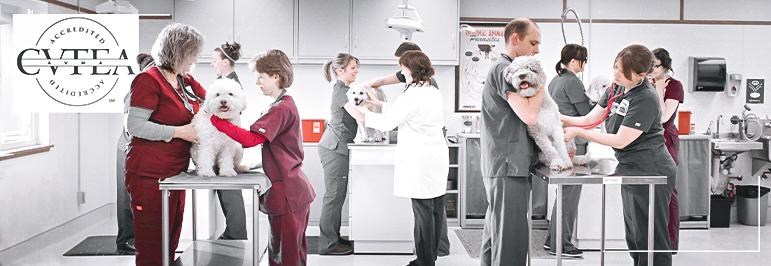Veterinary Technician
An online Info Session for the Veterinary Technician program will be taking place on Monday February 23, 2026 from 2-3pm.
Click here for more details about this info session.
This session will provide information about BTC’s Veterinary Technician program, including program requirements and the admissions process.

Veterinary Technician - AAS-T
Bellingham Technical College Veterinary Technician Program is nationally accredited through the American Veterinary Medical Association (AVMA)
1931 North Meacham Road, Suite 100
Schaumburg, IL 60173-4360
800.248.2862
https://www.avma.org/
Turn your love of animals into a satisfying career! BTC’s Veterinary Technician program is ideal if you have an aptitude for math and science, and are interested in being a valuable part of the veterinary care team. You’ll work with animals and people, in a job that is different every day.
With BTC’s high quality education and hands-on training, you’ll gain the valuable skills needed now by veterinary hospitals, surgery centers, specialty care providers, zoos, and wildlife facilities.
Note: BTC has not made a determination that the Veterinary Technology curriculum meets educational requirements for licensure/certification outside of Washington State. We encourage students who plan to work out-of-state to check relevant local licensure/certification requirements.
Vet Tech Helpful Links:
Veterinary Technician National Exam VTNE Pass-Rates
Institutional Animal Care and Use Committee IACUC Whistleblower Policy-Procedures
BTC Vet Tech Program YouTube:
Employment Information
Data are provided on a program (not credential) level
88% BTC graduate placement rate1
$43,548 starting annual wage2
$50,460 average annual wage2
$53,883 potential annual wage2
Entry Information
When Can I Start?
Students interested in the Veterinary Technician program should apply to the college and contact Admissions at 360.752.8345 or at admissions@btc.edu for assistance with getting started at BTC. A college application and your score on assessment testing and/or previous transcripts will determine where you begin your course sequence.
This program currently admits students into first quarter core classes in the Fall of odd number years.
Program-ready students are invited to register for Veterinary Technician courses. Students who have completed ALL prerequisite requirements before the start of first quarter core courses will be allowed entry based on the order in which they register.
Checklist for Veterinary Technician
Technical Standards for Vet Tech Program Entry
There is no separate admission process or application for this program.
What are the Minimum Entry Requirements?
A completed college admissions application and placement in English and Math. BTC uses a Guided Self-Placement process to help you choose the best starting point for your English and Math courses. Your selections will determine whether you begin with program coursework or complete prerequisites classes first. To get started or for help determining your English and math placement, contact the Outreach department at Outreach@btc.edu
ATI Test of Essential Academic Skills (TEAS) v.6
To get started or for help determining your English and math placement, contact the Outreach department at Outreach@btc.edu. Applicants must score at the "BASIC" level or higher in each of the four areas on one transcript. See the ATI Test of Essential Academic Skills handout for more information about this entrance assessment.
Having trouble scheduling your ATI TEAS assessment? More options are available! Email the Assessment Center at: assessment@btc.edu
Evidence of High School graduation or equivalent submitted to BTC Admissions Department with a graduation date (or GED Completion) before the start of the Program (September).
Students must be 18 years or older before beginning second quarter courses (January).
Early Program Course Requirements
Completion of the following courses with a minimum grade of 2.0 (C) or higher in each course:
- English Composition 1 (ENGL& 101)
- Math in Society (MATH& 107) or higher
- Introduction to Chemistry (CHEM& 121) or General Chemistry with Lab (CHEM& 161)
- General Biology with Lab (BIOL& 160)
- Interpersonal Communications (CMST& 210) or Public Speaking (CMST& 220) or General Psychology (PSYC& 100) or Lifespan Psychology (PSYC& 200) or Introduction to Sociology (SOC& 101)
- Intro to Veterinary Technology (VETT 100)
ONLY for students who are transferring prior credits to BTC: Official transcripts documenting prerequisite course completion must be submitted and evaluated before registration.
Clinical Requirements
AFTER admissions acceptance into the program and prior to beginning program classes students must submit proof of all Clinical Placement Requirements.
-
This program requires a criminal history background check prior to attending the clinic practicum. Criminal History Background Check Information Sheet
-
Veterinary Technician Informed Acknowledgment and Consent to Hazards and Risks
In response to new accreditation requirements by the American Veterinary Medical Association (AVMA), starting August 1, 2023 all students in the Veterinary Technician Program at Bellingham Technical College will be required to complete a two-dose rabies pre-exposure prophylaxis (PrEP) prior to being admitted to the program. This series is also recommended by the Centers for Disease Control and Prevention (CDC).
Notice About Marijuana Usage
Students who test positive for THC (marijuana, including prescription marijuana) will not be allowed entrance to Nursing and Allied Health programs with clinical components. Drug screening is a requirement of our clinical partner agencies. Although private recreational and medical use of marijuana is legal in Washington state, our clinical partner agencies are governed by federal laws, and marijuana is a prohibited substance at the federal level. If your final drug test results are positive, you will be ineligible to participate in the program that year and will be allowed to reapply to the program 12 months from the date of the positive test.
What are My Next Steps?
Classes
Total Program Credits: 146
Quarter 1
VETT 101 Veterinary Nursing I 4 CR VETT 102 Veterinary Anatomy & Physiology I 5 CR VETT 103 Veterinary Medical Terminology 3 CR VET 120 Medical Dosages and Calculations 3 CR VETT 201 Mentorship Lab I 2 CR Quarter 2
VETT 104 Veterinary Nutrition I 3 CR VETT 105 Learning for a Lifetime 2 CR VETT 106 Microbiology, Virology, & Mycology 3 CR VETT 107 Small Animal Parasitology 4 CR VETT 108 Radiology I 4 CR VETT 202 Mentorship Lab II 2 CR Quarter 3
VETT 109 Clinical Laboratory Sciences 4 CR VETT 110 Veterinary Anatomy & Physiology II 3 CR VETT 111 Small Animal Medicine I 3 CR VETT 112 Veterinary Nursing II (Surgical) 5 CR VETT 203 Mentorship Lab III 2 CR Quarter 4
VETT 117 Veterinary Nursing III (Large Animal) 4 CR VETT 118 Small Animal Medicine II 3 CR VETT 119 Advanced Clinical Lab Sciences 4 CR VETT 120 Anesthesia 5 CR VETT 204 Mentorship Lab IV 2 CR Quarter 5
VETT 113 Immunology & Pharmacology I 3 CR VETT 114 Dentistry 4 CR VETT 115 Radiology II 4 CR VETT 116 Large Animal Medicine 3 CR VETT 125 Humanity of Veterinary Medicine 3 CR VETT 205 Mentorship Lab V 2 CR Quarter 6
VETT 121 Exotic Animal Medicine 3 CR VETT 122 Veterinary Nutrition II 2 CR VETT 123 Veterinary Nursing IV (Critical Care) 5 CR VETT 124 Specialty Medicine 3 CR VETT 126 Pharmacology II 3 CR VETT 206 Mentorship Lab VI 2 CR Quarter 7
VETT 130 Veterinary Clinical Work Experience 12 CR
Program Outcomes
After successfully completing the Veterinary Technician AAS-T, students will be able to:
- Care for animals in a manner that is safe for both animals and humans;
- Promote public health;
- Accept the responsibilities of his/her profession, to provide compassionate, competent, ethical care in a professional, conscientious manner;
- Pursue lifelong learning to advance his/her knowledge of veterinary care;
- Take the Veterinary Technician National Examination (VTNE);
- Take the state exam and fulfill requirements for licensure as a veterinary technician;
- Understand normal anatomy, physiology and behavior of health for the species studied;
- Understand and participate in the process of diagnosis, therapy and prevention of animal disease;
- Understand the profession of veterinary technician including: occupational safety, public health, client and colleague communication, ethics of animal welfare, and the human-animal bond;
- Provide critical thinking skills to reason through clinical situations and take appropriate action;
- Provide social interactive skills to facilitate excellent communication with clients and colleagues;
- Provide psychomotor skills to facilitate quality, efficient diagnostic and therapeutic interventions;
- Provide learning skills and tools to promote learning throughout career and lifetime.
Employment Outlook
Job opportunities in this profession are expected to be excellent.
Criminal convictions may restrict or prevent student participation with internships and employment in this industry.
Veterinary technicians typically conduct clinical work in a private practice under the supervision of a veterinarian, performing various medical tests in a laboratory setting along with treating medical conditions and diseases in animals.
They may work in research facilities, where they may administer medications orally or topically, prepare samples for laboratory examinations, and record information on an animal’s genealogy, diet, weight, medications, food intake, and clinical signs of pain and distress. They may also work with other scientists in medical-related fields such as gene therapy and cloning. Other opportunities exist in biomedical research, wildlife medicine, the military, livestock management, education, or pharmaceutical sales.
Faculty & Support

Lisa Dzyban
Veterinary Technology
Lisa Dzyban
Veterinary TechnologyContacts
If you have questions about this program or want help with the admissions steps to Bellingham Technical College, please email outreach@btc.edu.
Current students wanting academic planning and support, can connect with the program Instructor(s) or email NursingAlliedHealthNav@btc.edu
